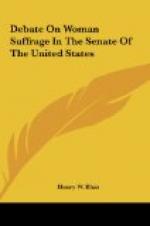It is like the old appeal of the master to his slave to know if he would be free. Full well did the wise and wary slave know that happiness depended upon declared contentment with his lot. But all the same the world does move. Colored men are free. Colored men vote. Women will vote. A little further on I shall revert to the evidence of a general and growing desire on her part and on the part of just and intelligent men that the suffrage be extended to women.
But we are told that husband and wife will disagree and thus the suffrage will destroy the family and ruin society. If a married couple will quarrel at all, they will find the occasion, and it were fortunate indeed if their contention might concern important affairs. There is no peace in the family save where love is, and the same spirit which enables the husband and wife to enforce the toleration act between themselves in religious matters will keep the peace between them in political discussions. At all events, this argument is unworthy of notice at all unless we are to push it to its logical conclusion, and, for the sake of peace in the family, to prohibit woman absolutely the exercise of freedom of thought and speech. Men live with their countrymen and disagree with them in politics, religion, and ten thousand of the affairs of life, as often the trifling as the important. What harm, then, if woman be allowed her thought and vote upon the tariff, education, temperance, peace and war, and whatsoever else the suffrage decides?
But we are told that no government, of which we have authentic history, ever gave to woman a share in the sovereignty.
This is not true, for the annals of monarchies and despotisms have been rendered illustrious by queens of surpassing brilliance and power. But even if it be true that no republic ever enfranchised woman with the ballot—even so until within one hundred years universal or even general suffrage was unknown among men.
Has the millennium yet dawned? Is all progress at an end? If that which is should therefore remain, why abolish the slavery of men?




